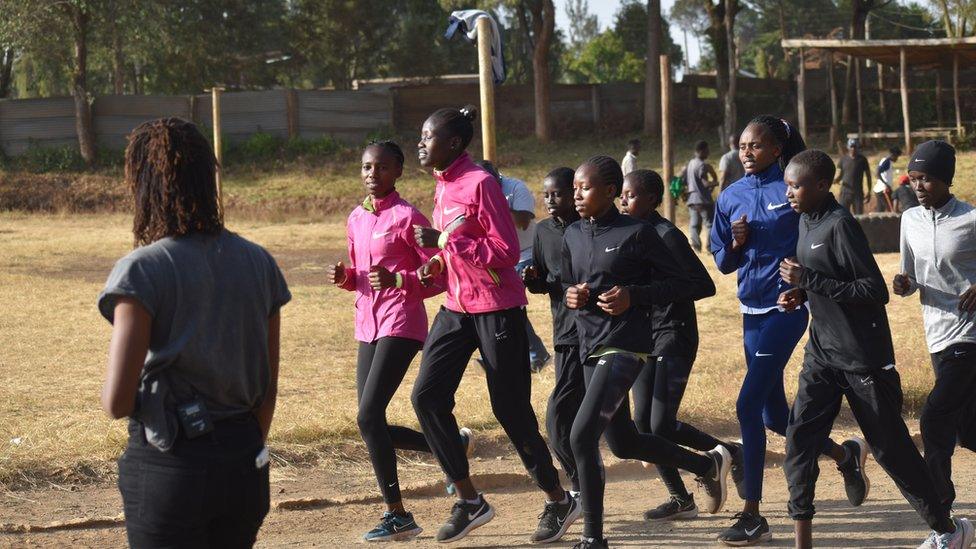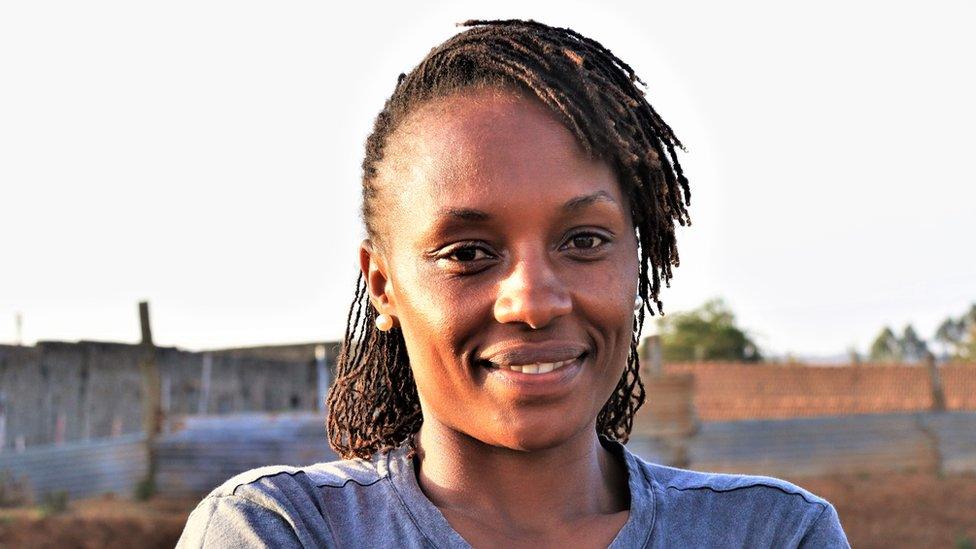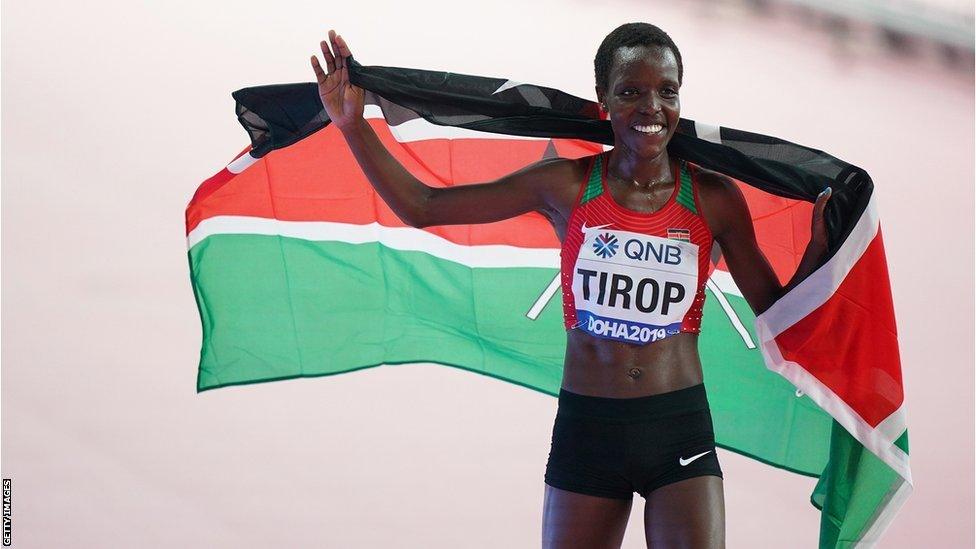The Lioness running a ‘safe place’ for Kenya’s young female athletes
- Published

Marathon runner Mary Ngugi created Nala Track Club to help young girls develop in a safe environment
One of Kenya's leading athletes says she wants to create a "safe place" for the next generation of female stars after starting the country's first girls-only running camp.
As a junior, Mary Ngugi received her training and education at a mixed-gender camp - meaning the 34-year-old, a two-time gold medallist at the World Half Marathon Championships, has seen first-hand the problems young girls can face as they look to build a career in the sport they love.
"Being abused by men, harassed, intimidated, not being able to be themselves," she lists for BBC Sport Africa.
"Some are getting pregnant, dropping out of camp because maybe the coaches or the pacers are trying to harass them."
So Mary has launched her new initiative, Nala Track Club.
"Nala is an African name for a powerful woman or a lioness. We want these girls to be that: strong, powerful, empowered, someone who can say no, I'm not doing that.
"I'm trying to give these girls a safe place so they can be themselves," she adds.
"I've always wanted to change what is happening, not just in athletics but also in the society."

Mary Ngugi hopes to see more female coaches and agents in Kenya
'At home, it's the father who decides'
Nala, which opened in October 2022, currently supports eight girls, aged between 14 and 22.
It is located in Nyahururu Town, a four-hour drive from the Kenyan capital Nairobi.
When BBC Sport Africa visits late in the afternoon, five of the girls arrive soon after, chit-chatting among themselves following a day at school.
After a quick debrief on how lessons went, they change into their training kit. Mary, who has a daughter of her own, tells them to stop giggling - for her it is important they learn to have a proper voice of their own.
"At home, it's the father who decides what to do, or the brothers. But when these girls are at camp they have the confidence to be themselves."
Nala Track Club is Kenya's first girls-only running club and allows the girls to be themselves, according to Mary Ngugi
Mary believes Kenyan society intimidates some young girls, harming their self-confidence.
"Everyone is repeating the same: you just need to be a wife, you just need to be a better mother. You can be more than that - you can be a mother (and) an athlete.
"You can manage your business, you can manage your contracts, you don't need someone doing that."
Following a run through the town, the Nala girls arrive at the dusty Nyahururu Stadium for a 40-minute track session.
Mary watches on, giving instructions alongside the one female coach attached to the project.
"Because they are young, we are coaching them for 1500m and 800m. It's more about their speed," she explains.
Back at camp, the girls eat and study. Mary even helps with homework because, as Nala bids to rewrite the narrative, hitting the books is equally as important as training on the track.
"You have to go to school, whether you can afford it or not," says Mary decisively.
"We are trying to empower these girls to know that I'm not just an athlete."

Nala Track Club views education as equally as important as training on the track and helps fund schooling
But not everyone is impressed with Mary's outlook. She's received abuse on social media, accusing her of creating bad-mannered women - an accusation she refutes.
"I'm definitely not creating rebellious women in society. I'm just trying to tell these girls you can be better, you deserve better."
There is little doubt the camp could be life-changing for some of the girls.
"I am happy at Nala Camp because we get all the training facilities," Millicent Chelangat tells BBC Sport Africa.
"I am learning so much, like how to interact with others. We have older girls who advise us.
"I want to be like Mary Moraa [Commonwealth Games 800m champion], she is my role model, and I want to also be a journalist," adds the 17-year-old.
"I wanted to come here because there is nothing meaningful going on at home," reveals 15-year-old Carren Chepchirchir, who hopes to become a professional athlete.
"Athletics will give me a good life and I will be able to help my parents."

Agnes Jebet Tirop won the bronze medal in the 10,000m at the 2019 Doha World Athletics Championships
Inspired by a murder
Mary describes the murder of her former team-mate, Agnes Tirop, as the "final straw" which forced her to take action to fight back against the way some female athletes are treated.
Tirop, a 10,000m bronze medallist at successive World Championships, was stabbed to death in her own home in October 2021.
Her husband has been charged and is awaiting trial.
"It was really sad," says Mary when discussing Tirop's death.
"I was like, we don't have to wait for someone else to go through a tragedy to take the next step."
Tirop is not the only female athlete to be a victim of violence. Six months later, another runner, Damaris Muthee Mutua, was also killed, with both cases reigniting the debate about gender-based violence in athletics.
"It was one of the biggest reasons for me to start, because before it was just a dream," confirms Mary.
Ultimately, the hope is that Nala will boost the safe participation of women in all facets of athletics, increasing representation when it comes to things like coaches and agents.
"I would like in 10 years to see more camps like this.
"If other people can come up and start one or two, that's my dream come true."
For now, Mary is taking pride in Nala's current set of young lionesses.
"When I see how happy they are, the smiles on their faces, them treating me like a big sister - it's an amazing experience."